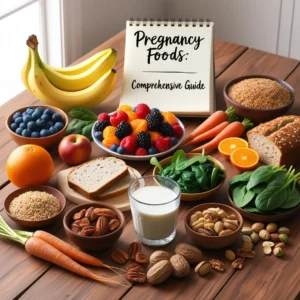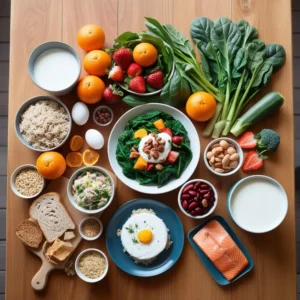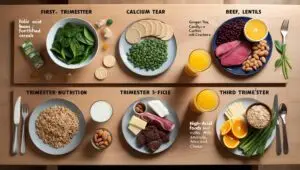Introduction
Congratulations on embarking on the incredible journey of motherhood! As you nurture life, the foods you choose play a vital role in your baby’s growth and your overall well-being. But with so much information out there, it can feel overwhelming to know what to eat, what to avoid, and how to adapt your diet to the needs of each trimester.
This guide breaks it down into simple, actionable tips to ensure you and your baby get the nutrition you need. Whether you’re battling morning sickness or planning for a healthy second trimester, we’ve got you covered.

What to Eat During Pregnancy
The foundation of a healthy pregnancy diet is balance. Focus on nutrient-dense foods that provide vitamins, minerals, and energy.
Essential Foods for Pregnancy
- Fruits and Vegetables:
- Aim for at least 5 servings daily. Include options rich in Vitamin C (oranges, strawberries) and folate (spinach, broccoli).
- Whole Grains:
- Choose brown rice, oatmeal, and whole-grain bread for fiber and energy.
- Protein-Rich Foods:
- Opt for lean meats, eggs, beans, lentils, and nuts to support your baby’s growth.
- Dairy Products:
- Yogurt, milk, and cheese provide calcium for your baby’s developing bones.
- Omega-3 Fatty Acids:
- Include fatty fish like salmon (in moderation) to boost your baby’s brain development.

Foods to Avoid During Pregnancy
While many foods are beneficial, some can pose risks to your baby’s health.
High-Risk Foods to Steer Clear Of
- Raw or Undercooked Seafood:
- Avoid sushi, shellfish, and smoked salmon to reduce the risk of infections like listeria.
- Unpasteurized Dairy and Juices:
- These can contain harmful bacteria. Stick to pasteurized options.
- High-Mercury Fish:
- Swordfish, king mackerel, and shark can impact your baby’s nervous system.
- Processed Meats:
- Deli meats and hot dogs can harbor bacteria unless heated thoroughly.
- Alcohol and Caffeine:
- Alcohol is a no-go. Limit caffeine to under 200 mg daily (about one cup of coffee).

Trimester-Specific Nutrition Tips
Your nutritional needs evolve throughout pregnancy. Here’s how to adjust your diet for each trimester:
First Trimester (Weeks 1–12)
- Focus: Managing nausea and building a nutrient foundation.
- Top Foods:
- Folic Acid-Rich Foods: Prevent neural tube defects with spinach, beans, and fortified cereals.
- Ginger: Ease morning sickness with ginger tea or ginger candies.
- Pro Tip: Keep snacks like crackers on hand to combat nausea.
Second Trimester (Weeks 13–26)
- Focus: Supporting growth and preventing anemia.
- Top Foods:
- Iron-Rich Foods: Beef, lentils, and fortified cereals combat fatigue. Pair with Vitamin C for better absorption.
- Calcium Sources: Strengthen baby’s bones with milk, almonds, and cheese.
- Pro Tip: Stay hydrated and incorporate light exercise for digestion.
Third Trimester (Weeks 27–40)
- Focus: Preparing for delivery and maintaining energy levels.
- Top Foods:
- High-Energy Foods: Whole grains and nuts keep you energized.
- Fiber-Rich Options: Combat constipation with fruits, vegetables, and oats.
- Pro Tip: Small, frequent meals can ease heartburn.

Simple Pregnancy Recipes to Try
- Morning Smoothie: Blend spinach, banana, Greek yogurt, and chia seeds for a nutrient-packed start to your day.
- Quinoa Salad: Mix quinoa, cherry tomatoes, cucumbers, and feta cheese for a light lunch.
- Baked Salmon with Veggies: Pair salmon with asparagus and sweet potatoes for a delicious, omega-3-rich dinner.
Common Pregnancy Nutrition Myths Busted
- “You’re Eating for Two”: Not quite. You only need about 300 extra calories a day in the second and third trimesters
- “Spicy Foods Induce Labor”: There’s no scientific evidence to back this.
FAQs About Pregnancy Foods
- Can I eat sushi during pregnancy?
- Avoid raw sushi, but cooked options like California rolls are safe.
- Should I take supplements?
- Prenatal vitamins are essential but consult your doctor for personalized advice.
- Is it okay to eat chocolate?
- Yes, in moderation. Dark chocolate may even improve mood and reduce stress.
Conclusion
Eating the right foods during pregnancy is one of the most empowering ways to support your baby’s development and ensure your health. By following this guide, you’re not just eating; you’re building a foundation of wellness for you and your baby.
If you found this article helpful, share it with other moms-to-be! For more tips and resources, subscribe to our blog and join our supportive community of mothers
Call-to-Action:
Have questions or need personalized advice? Drop a comment below, or explore our free meal plans for pregnant moms. Together, let’s make your pregnancy journey healthy and happy!
